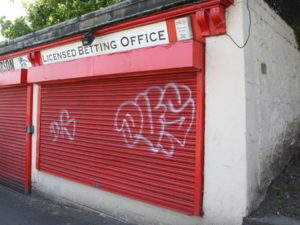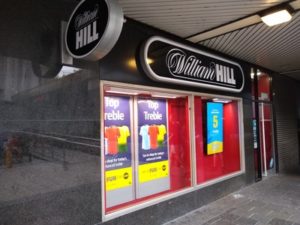What Places in the UK Have the Most Betting Shops?
 The United Kingdom has been known for its liberal gambling market over the years, with legal and easy access to casinos, sports betting shops, bingo halls and more throughout the country. Of course, in recent times, issues have arisen that have led to many of the sports betting shops closing their doors for good. William Hill shut down 119 of its high street betting shops, it was announced in 2020. However, that doesn’t mean that they aren’t still in abundance on the UK’s streets with at least 7,500 still open.
The United Kingdom has been known for its liberal gambling market over the years, with legal and easy access to casinos, sports betting shops, bingo halls and more throughout the country. Of course, in recent times, issues have arisen that have led to many of the sports betting shops closing their doors for good. William Hill shut down 119 of its high street betting shops, it was announced in 2020. However, that doesn’t mean that they aren’t still in abundance on the UK’s streets with at least 7,500 still open.
These shops are not, however, evenly distributed across the country and there have been suggestions that brands may even target poorer areas. Where do you find more sports betting shops in the UK? A recent report revealed information that the country’s poorer districts feature a lot more betting shops on the streets than those considered to be wealthier areas. In fact, a fifth of all gambling premises within the United Kingdom are now found within these locations, according to research. That begs the question – is there any wonder that gambling addiction and people getting into debt is on the up? It is not just betting in the shops themselves that can cause issues, the fact there are a disproportionate amount of shops means people in that area are more exposed to gambling in general, especially children, and this could lead to future gambling issues online too.
Here, we’re going to look at the places with the most betting shops around the UK, and why it is that they have been opened in such locations. Plus, even though we know that the number of betting shops on the high streets are declining, is this true for everywhere or just in specific areas? Join us for a closer look at the places in the UK with the most betting shops.
Study Shows Poorer Districts Top of the Results
 The University of Bristol carried out a study on the locations in the UK that play host to the most betting shops. In doing so, it was discovered that locations like Glasgow, Liverpool and Middlesbrough had the highest number of such, alongside the country capital of London. The research was done amid the current ongoing review of the Gambling Act.
The University of Bristol carried out a study on the locations in the UK that play host to the most betting shops. In doing so, it was discovered that locations like Glasgow, Liverpool and Middlesbrough had the highest number of such, alongside the country capital of London. The research was done amid the current ongoing review of the Gambling Act.
Tackling gambling problems has been one of the primary focuses of the updated Gambling Act. A spokesman for the UK Gambling Commission recently stated that it was considering the issues that have been raised by any gambling-related research.
Yet, despite the number of bookmaker shops declining in the past few years, figures show that the country still has more betting establishments than stores operated by the eight biggest supermarket chains of the UK combined.
The study, which is supported by the Standard Life Foundation, also highlights the fact that there is a disproportionate number of standard amenities available in poorer areas in comparison to wealthier locations.
For example, poorer areas of the country have a 10% share of the entire number of food stores within them. At the same time, they host a total of 34% of the country’s amusement arcades, as well as 30% of the bingo halls and 29% of the adult gaming centres. Comparing that with the higher-class areas of the UK, a much more even spread of everything is available, with the number of supermarkets and libraries equalling that of betting shops.
Studies also show that about 10% of the schools within the country are within five minutes of a gambling venue, which affects about 742,000 schoolchildren learning at over 2,000 schools.
Speaking on these findings, the senior research associate at the University of Bristol, Jamie Evans said that it “highlights the clear mismatch” when looking at poorer areas and comparing them against the richer locales.
“Rather than having greater access to the facilities, services and opportunities that help people to improve their lives, those in more deprived communities are disproportionately faced with choices that can often prove harmful”
Not a New Finding
 While the latest research done by the University of Bristol does highlight the disproportion between poorer and more affluent areas, this is not something that is a new finding. Back in 2017, a study was conducted to find out where the majority of high-stakes gambling machines were located, which was prior to the maximum stakes on those machines being reduced to £2. A map of the UK displayed that bookmakers tended to cluster in the most deprived areas – the locations where people can least afford to lose their money.
While the latest research done by the University of Bristol does highlight the disproportion between poorer and more affluent areas, this is not something that is a new finding. Back in 2017, a study was conducted to find out where the majority of high-stakes gambling machines were located, which was prior to the maximum stakes on those machines being reduced to £2. A map of the UK displayed that bookmakers tended to cluster in the most deprived areas – the locations where people can least afford to lose their money.
Experts went on to accuse bookmaker companies of targeting some of the nation’s most vulnerable people with the fixed odds betting terminals (FOBTs), which previously had maximum bet limits of £100 per round. Campaigners had been petitioning for changes to be made even back then, citing the untold misery that many players had experienced after sinking into debt from playing the games.
Studies showed that the cities of London and Westminster had seen gamblers lose £31 million across 120 betting stores. Various other London boroughs had also dominated the top 10 locations at that time, with the highest spend outside of the capital being Liverpool Riverside at the time. In comparison, there were no FOBTs found in Henley-on-Thames, which has an average house price that is well over the national average level. A similar situation was present in Wirral West, where two betting shops were found to have only taken £299,000 via the FOBTs.
And while the reduction in the maximum bets on those machines did come into effect eventually, the betting shops largely remained operational.
What Do Bookmakers Look for in a Prime Location?

Of course, there must be a reason as to why the betting shops have been set up in these specific locations. The key to finding a good bookies spot is obviously to ensure that it will be profitable. Everyone wants to make money in business. Most bookmakers will try to secure a location that is in close proximity to other things like shops and pubs and clubs, that it is quite central and where customers can easily access them.
Today, around 7,650 bookmaker shops remain in existence within the UK, down from around 9000 in 2016, and the vast majority of them are owned by the following brands:
- William Hill
- Coral
- Betfred
- Ladbrokes
- Paddy Power
The top 10 locations that have betting shops present on their high streets and the top 10 that don’t are as follows:
| Top 10 Areas Most Bookies per Capita | Top 10 Areas Fewest Bookies per Capita |
|---|---|
|
|
The majority of locations on the left-hand side are located in the north of the country, featuring poorer locations like Blackpool, Grimsby and South Shields. And while the right-hand column does feature locations like Luton and Smethwick (which aren’t necessarily exceptional wealthy areas), it certainly has more affluent areas involved such as Cambridge and Oxford.
Grimsby is the worst-affected area for the number of bookies, with a single bookmaker shop for every 6,721 people living there. If you compare that with Oxford, which has a single betting shop for every 11,398 people, there is a visible stark difference in play. The average income in Grismby is £21,000, while the average in Oxford is £26,500.
The poorer parts of the country have always had many more bookmakers in operation, though. At least within the past two decades. Back in 2013, a single high street located in Newham, East London played host to 18 betting shops, and all of them included the then-lucrative FOBTs, bringing in £200,000 every year. That marked a 25% rise in the number of bookmakers operating in the Newham borough – the equivalent of six betting shops per square mile. Back then, Newham was also marked as third in a list of the most deprived areas of England, coming just before Manchester and behind Hackney, another London district.
Do Bookmakers Target Poorer Districts?
 Judging by the figures and the research done, it would definitely appear as though bookies are purposely setting up shop in poorer locations. Of course, property prices are also lower in these areas too, resulting in the companies managing to secure buildings for their services at a cheaper price. Communities also tend to be more densely populated in poorer areas, more houses per square mile basically, meaning there is a higher relative foot flow for betting shops. People are also more likely to walk rather than drive and stay within their local areas for shopping and leisure. However, this is by far not the sole or main reason as to why they are choosing to utilise these locations.
Judging by the figures and the research done, it would definitely appear as though bookies are purposely setting up shop in poorer locations. Of course, property prices are also lower in these areas too, resulting in the companies managing to secure buildings for their services at a cheaper price. Communities also tend to be more densely populated in poorer areas, more houses per square mile basically, meaning there is a higher relative foot flow for betting shops. People are also more likely to walk rather than drive and stay within their local areas for shopping and leisure. However, this is by far not the sole or main reason as to why they are choosing to utilise these locations.
The Association of British Bookmakers has frequently responded to such accusations regarding their choice of locations around the UK, stating that the number of betting shops have been highly consistent throughout the years. This is not true at all though, as the UK at one point featured 16,000 betting shops on its high streets, whereas only half of that figure now exist. And the likelihood is that more bookmakers will close their doors in the future, considering many people are continuing to turn to the online world for their gambling activity.
It is likely that the shops within the wealthier areas will close up their doors first, though. After all, if bookies can get more from operating in deprived areas in comparison, they will always go where the money is. And it seems as though they are actually targeting these customers in the same way that online sites target VIP players who can often not afford to lose the money they are urged into depositing and playing with. The review of the Gambling Act is said to be targeting such VIP schemes though, possibly leaving operators with the need to garner their income from elsewhere.
Concerns have also been raised over the locations of problem gambling prevention venues as well, though. More than half of the 348 centres providing such services are found within five minutes’ walk of a gambling establishment. In this respect, what is there to stop an addict from attending a counselling session and then marching straight down the street to the betting shop afterwards with it being so close?
Campaigners have targeted local authorities, stating that they should be given greater powers to prevent gambling venues from being able to open in such situations.
A survey done by YouGov in 2018 asked people if they would be happy to have a gambling venue on their ideal high street. A negative response came from 73% of the people surveyed.
Speaking on the situation of where the betting shops in the UK are located, Carolyn Harris – the chair of a cross-party group of MPs looking at gambling-related harm – said that the industry always puts “profit before people”. And while she did mention that this is not something that is an unexpected scenario, it doesn’t make it any less disturbing to hear.
More Gambling Venues In Areas of Deprivation
 It’s not only sports betting shops that have been found to exist in clusters of high deprivation areas across the UK, but other gambling establishments, too. According to research by the Standard Life Foundation, bingo halls are the biggest offender when it comes to these establishments being found in poorer areas of the country. This was followed on by “family entertainment centres”, which are often located in seaside towns – often more likely to suffer from economic deprivation. Amusement arcades were next in line.
It’s not only sports betting shops that have been found to exist in clusters of high deprivation areas across the UK, but other gambling establishments, too. According to research by the Standard Life Foundation, bingo halls are the biggest offender when it comes to these establishments being found in poorer areas of the country. This was followed on by “family entertainment centres”, which are often located in seaside towns – often more likely to suffer from economic deprivation. Amusement arcades were next in line.
Yet, even though bookmakers had a weaker correlation when compared to these gambling establishments, it was still significant enough to be marked down as a highlighted statistic. Land-based gambling still accounts for around 44% of gambling losses in the UK every year, which stands at around £10.2 billion.
“Predatory gambling companies target the poor and the young. We know the tragic cost of this targeting – at least one death per day”
, said Liz Ritchie, who lost her own son Jack to a gambling-related suicide in 2017.
“Many of the young people we have lost…were enticed into gambling premises very near schools or on their bus routes home”.
“At the moment local communities have so little say in opposing any planning”
, said her husband, Charles.
Despite the couple wanting to see local authorities and communities given more power to cancel out plans for betting shops, they have had various barriers put in their way. A spokesman for the Betting and Gaming Council said that the industry has had a huge impact on providing jobs and generating plenty of money in taxes to pay for vital public services.
However, this was slated by Mr Evans of the research team at Bristol University, stating that it simply isn’t good enough. Even though it is recognised that gambling premises can provide jobs, it is also known that participating in gambling can lead to various financial difficulties for many people, as well as social and health issues, he commented.
“These are problems which simply add to the many challenges that our most deprived communities already face”
, said Mr Evans.



